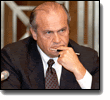That Scalia Sure Is Smart
Someone just gave me a clipping about Justice Scalia up in Canada for some conference talking about torture and the power of the presidency during wartime. Good stuff, just what you would expect from Scalia.
I just couldn't possibly do it justice:
The conservative jurist stuck up for Agent Bauer, arguing that fictional or not, federal agents require latitude in times of great crisis. "Jack Bauer saved Los Angeles. ... He saved hundreds of thousands of lives," Judge Scalia said. Then, recalling Season 2, where the agent's rough interrogation tactics saved California from a terrorist nuke, the Supreme Court judge etched a line in the sand.
"Are you going to convict Jack Bauer?" Judge Scalia challenged his fellow judges. "Say that criminal law is against him? 'You have the right to a jury trial?' Is any jury going to convict Jack Bauer? I don't think so.
"So the question is really whether we believe in these absolutes. And ought we believe in these absolutes."
* * * *
Judge Mosley told the panel that rights-respecting governments can't take part in torture or encourage it in any way. "The agents of the state, and the agents of the Canadian state, under the Criminal Code, are very much subject to severe criminal sanction if they would engage in torture," he said.
But the U.S. Supreme Court judge choked on that position, saying it would be folly for laws to dictate that counterterrorism agents must wear kid gloves all the time. While Judge Scalia argued that doomsday scenarios may well lead to the reconsideration of rights, in his legal decisions he has also said that catastrophic attacks and intelligence imperatives do not automatically give the U.S. president a blank cheque - the people have to decide. "If civil rights are to be curtailed during wartime, it must be done openly and democratically, as the Constitution requires, rather than by silent erosion through an opinion of this court," he dissented in a 2004 decision. The judicial majority ruled that a presidential order meant that an American "enemy combatant" wasn't entitled to challenge the conditions of his detention, which happened to be aboard a naval brig.
* * * *Generally, the jurists in the room agreed that coerced confessions carry little weight, given that they might be false and almost never accepted into evidence. But the U.S. Supreme Court judge stressed that he was not speaking about putting together pristine prosecutions, but rather, about allowing agents the freedom to thwart immediate attacks.
"I don't care about holding people. I really don't," Judge Scalia said.
Even if a real terrorist who suffered mistreatment is released because of complaints of abuse, Judge Scalia said, the interruption to the terrorist's plot would have ensured "in Los Angeles everyone is safe." During a break from the panel, Judge Scalia specifically mentioned the segment in Season 2 when Jack Bauer finally figures out how to break the die-hard terrorist intent on nuking L.A. The real genius, the judge said, is that this is primarily done with mental leverage. "There's a great scene where he told a guy that he was going to have his family killed," Judge Scalia said. "They had it on closed circuit television - and it was all staged. ... They really didn't kill the family."
That's our Scalia. Truly, I think that man is the brain trust of our movement.
And the thing is, he just nailed the real message: you can trust what you see on TV, and you absolutely should bring TV to real life law and policy. In my case, take what you saw on Law & Order and make me the decider of all things related to, well, law and order.




No comments:
Post a Comment